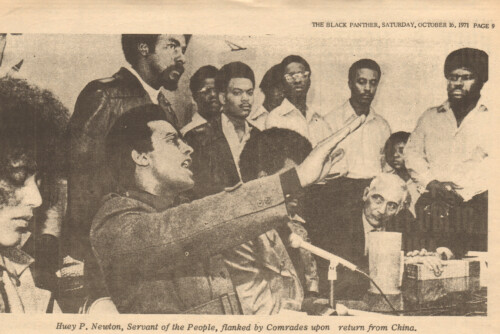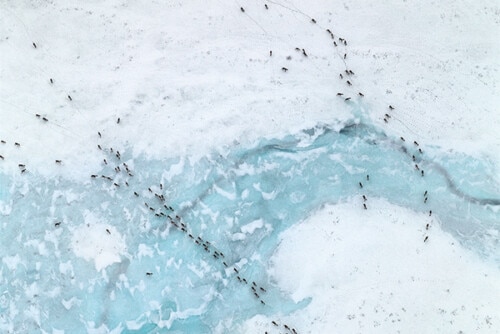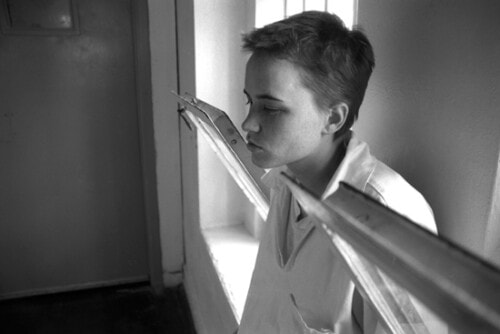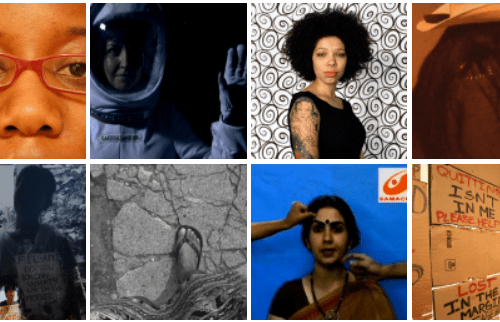Imaginary Dialogues and the What Could Have Been
In Sa-I-Gu, the interviewees describe their sense of having been sacrificed with no power or responsibility for the conditions of violence they encounter. In The Betrayal, Thavi’s father similarly laments that the United States extended no recognition of its former Laotian allies, its “loyal hunting dogs,” and accordingly revealed itself to be “nerakhoon, those who betray.” But the experience of having been sacrificed also, notably, has the effect of reincorporating Asian migrant victims as speaking subjects, a project to which the filmmakers themselves contribute. In that reassemblage, Asian immigrants become responsible to other others, the bonds of obligation and experience of loss form the grounds of – and demand for – ongoing ethical deliberation, material redistribution, and new political configurations. Thus, although minority subjects undertake a politics of betrayal that falls short of the idealized Afro-Asian solidarities cultural critics might want for them, comparative American studies can also render an ethical vision of the possible alliances and futures embedded within, but obscured by, that politics.
Such a response requires not only the restoration of historical contexts (e.g., empire or the Cold War) in which racial and ethnic formation takes place and the recovery of political and intellectual exchange in social movements. 1 It also involves seeking out unseen connections and openings that become available only as formal intimations and momentary flashes of convergence. 2 These instances of recognition or resonance across seemingly disparate formations demand a critical inventiveness and the aesthetic manufacture of what María Eugenia Cotera describes as “imaginary dialogues” that trouble – or betray – conventional notions of evidence, archive, and objectivity. 3 The focus of feminist and queer scholars on the hidden role of the intimate, the affective, the diminutive, and the domestic proves especially instructive for imagining the ethical possibilities of comparison in Afro-Asian studies. This methodological creativity adopts the grammar of the past conditional in which, as Lowe explains, “the ‘what could have been’ symbolizes aptly the space of a different kind of thinking, a space of productive attention to the scene of loss” and “in which what is foreclosed as unknowable is forever saturating the ‘what-can-be-known.'” 4
Notably, in The Betrayal, the many layers of betrayal that the film uncovers make it impossible to locate a single antecedent for the film title and in this way recall how, in The Invisible Man, the narrator’s grandfather’s confession that he has “been a traitor all my born days, a spy in the enemy’s country” raises a host of questions about identity and the collective good, but does not solve them. While his father’s abandonment of his wife and children reverberates in the strained relations between Thavi, his siblings, and their mother, Thavi’s father also figures as both a traitor to the socialist politics of third-world internationalism and a reminder of the price that the Laotian people – and other postcolonial peoples – paid at the hands of authoritarian Communist states. Furthermore, transported into the interior of the United States, this web of betrayed trusts also mutates the search for the lost father into the loss of a son, as Thavi’s half-brother dies in gang-related violence, and intimations of interracial solidarities never pursued. As the film’s subjects make seemingly impossible choices between competing loyalties, their agency also registers as violations of constitutive bonds. We never hear the two sisters in Laos, to whom Thavi returns, speak, but their silent faces materialize the ethical encounter, calling the subject to make an account of himself. Thavi’s task, to justify his family’s departure from them, is staggering, and the film’s silence on this front makes it impossible for us to know how he responds to that task, even as it insists that he does.
The Betrayal (2008)
Near the end of Sa-I-Gu, Edward Jae Song Lee’s mother recalls that, as he decides to head out into the riot, Edward is inspired by the story he hears on the radio about women in Korea carrying stones in their apron pockets to fight in nationalist campaigns for independence and accuses his mother of allowing herself to be cowed by Americans.
Sa-I-Gu (1993)
Of course, from the perspective of the Afro-Asian century, Lee’s own actions are not only definitively not heroic, but also shot through with an antiblack racism that forecloses direct forms of recognition between the two groups. And yet, his mother’s diasporic memory opens up imaginary dialogues about the “what could have been.” Thus, when she closes the film by observing that her son “just went out and did not come home,” Mrs. Lee’s words illumine an ethico-politics of betrayal that keeps open the avenue for the other to return. Like the India that The Invisible Man momentarily happens upon, the unexpected places and forms of that return serve as a trace of the radical freedom that obligates us to her.
In the face of the self-certainties that underwrite the radical impulses to recover histories of transracial inspiration and influence, connection, collaboration, and exchange, I suggest an ethical orientation demands that we open ourselves to the other, with the many doubts, contradictions, and ambiguities such openness entails. This ethical approach compels and reconfigures our reading across traditional histories and archives in ways that are risky and without guarantees. When it comes to interracial encounters between people of color in the United States, literary and expressive cultures are often the only site where such relational ties have been forged and sustained for the longue durée, such that they come to archive the forms of recognition and desire foreclosed by nationalist formations of race and ethnicity. But we cannot presume to know beforehand who or what we will find there; that is, we cannot presume to know the other in her own modes and encounters of responsibility.
Wai Chee Dimock describes literary culture as a primary site for the creation of new relational forms, “brought into being by that most minute, most intimate of acts, the act of reading. This act, pursued within the compass of a word, a phrase, a sentence, generates relational ties that can nonetheless extend for thousands of miles and thousands of years.” 5 Dimock’s “planetary” framework for these relational ties in American literature seems to incline her toward, as Mark McGurl suggests, an aesthetic optimism, a “drive toward an extension of sympathy with the geohistorical other” that “unchecked might become sympathy with the absolutely other, with the 13.7 thousand-million-year history of (for the most part) utter indifference to life we find in the geological and cosmic record.” 6 An ethics of betrayal aims to elicit not sympathy, however, but a reckoning with that “utter indifference” by which new political possibilities might emerge. In other words, in vigilantly awaiting the return of the absolutely other, we must critically enter into politics without end, and see our encounters with other others always as occasions for rethinking how we might let others be in their own right.
This means also that our disciplinary and methodological tools need to be attuned to how and why such encounters are likely to be channeled into the realms of the textual, the imaginative, and the fictional. A liberal multiculturalist reading practice can hardly generate this “what could have been,” but limited, too, are other affiliative practices that fail to take into account the missed, hidden, and failed encounters that such texts inscribe, because they remain tied to forms of desire and intimacy that are legible within the political scripts we bring to our subjects. An ethics of betrayal articulates the losses and sacrifices of the “what could have been,” to the “what is to come,” and the “what will have been” in order to imagine other lifeworlds and to chart new political horizons.
- With respect to “the Afro-Asian century,” there is perhaps no more powerful vision of the what could have been recently than the 1955 Bandung Conference, which, as Ho and Mullens suggest, provides “both the watershed and high-water mark of black-Asian affiliation and the unfinished and imperfect dream of a road still being pursued and paved.” See Afro Asia, 5. An ethics of betrayal nevertheless insists that Bandung does not exhaust the imaginative or critical possibilities of Afro-Asian encounter in the present.[↑]
- Brent Hayes Edwards calls for a methodology by which to examine that which inhabits the archive as a “suspicious character” or “agitator”; an “epistemological irruption” of the subaltern at the limits of historical narrative also displays a “discursive malleability” that allows for the subaltern to inscribe herself as self-conscious subject through an array of formal means. See “The Shadow of Shadows,” positions 11, 1 (Spring 2003): 30, 42.[↑]
- María Eugenia Cotera, Native Speakers: Ella Deloria, Zora Neale Hurston, Jovita González and the Poetics of Culture (Austin: University of Texas, 2008), 1. [↑]
- Lisa Lowe, The Intimacies of Four Continents (Durham: Duke University Press), 41, 175.[↑]
- Wai Chee Dimock, Through Other Continents: American Literature across Deep Time (Princeton: Princeton University Press, 2006), 8.[↑]
- Mark McGurl, “The Posthuman Comedy,” Critical Inquiry 38 (Spring 2012): 541.[↑]




